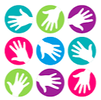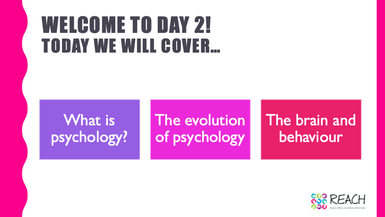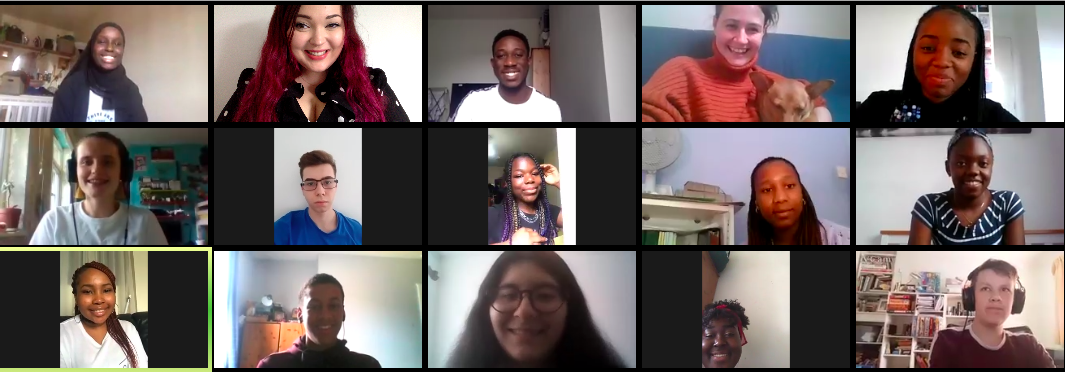Aged 14-19? Interested in mental health research?
Become part of the REACH team as a virtual work experience student!
Our virtual work experience for 2022 has now closed! Stay tuned for potential future dates coming soon.
A big thank you to all of our students who have taken part so far!
If you are from a REACH school would like to join us, you can also send us an email at [email protected]
A big thank you to all of our students who have taken part so far!
If you are from a REACH school would like to join us, you can also send us an email at [email protected]
Why does REACH provide virtual work experience?
During meetings with our Young Person's Advisory Group in April 2020, the REACH team heard first hand from students whose work experience placements were cancelled due to the COVID-19 pandemic. They were unsure how they would find work experience for their CV, applications for jobs, Sixth Form, College or University.
Hearing the experiences of these young people inspired us to create a virtual work experience opportunity with REACH at King's College London that could be completed entirely online. Since we launched in July 2020, over 250 young people have engaged with the programme!
From this virtual work experience, I hoped to gain more knowledge on REACH, psychology and the different aspects which are important to having successful studies. It has definitely met my expectations because I have been able to learn new skills for life!
- Virtual work experience student
- Virtual work experience student
So far, over 250 young people have engaged with the REACH virtual work experience programme!
We encourage anyone from REACH schools to get involved in the programme. It doesn't matter if you've left school, haven't studied psychology before or if you don't want to go to university - we have developed the placement to be interesting and useful for all! The programme runs for five days and covers a new topic each day:
During the work experience week, the REACH team also run optional workshops for those who want to ask questions or hear more about careers, studying psychology and applying for university.
- Introduction to The REACH Study
- Introduction to Psychology
- Introduction to Mental Health
- Introduction to Research Methods
- Public Engagement in Research
During the work experience week, the REACH team also run optional workshops for those who want to ask questions or hear more about careers, studying psychology and applying for university.
Every day of the programme starts with a group call with a member of the REACH team to introduce the topic for the day. During these calls, we encourage students to get involved, ask questions and discuss the content with each other and the REACH team as much as they like. Students are then given a work sheet and tasks to complete during the afternoon. These are designed to be as flexible as possible, allowing the students to explore their own interests and develop the skills that will be most valuable to them.
The REACH work experience: from an attendee's perspective
Written by Adna Hashi - REACH Young Person's Community Champion and virtual work experience student
I did my work experience with REACH in the June half term of 2020. Last year was a very unfortunate year for all students on the lookout for work experience. At that point I would take any experience to help me have the upper hand when it came to my personal statement and the hunt of applying to university. Little did I know how much I would gain when the invitation to this work experience dropped into my inbox. I personally can’t thank the REACH team enough for this virtual work experience week, because it helped me gain unmatched skills. The work experience introduces psychology, covering all the basics. Therefore, I am going to give you an insight into the week, drawing on some other reviews of the work experience from fellow students and aspiring researchers of similar ages in this blog post. Make sure to read all of it!
To summarise:
REACH (Risk, Resilience, Ethnicity and Adolescent Mental Health) is a research study at King’s College London. As part of REACH’s engagement work, they offer a five-day virtual work experience opportunity to young people with an interest in psychology, mental health and/or research. The programme aims to develop the skills needed for working in mental health research and achieves this through covering a range of topics including psychology, mental health, research methods and public engagement in research.
The sessions provide attendees with the knowledge they need to complete tasks that researchers working in mental health do on a regular basis including, designing research, advising on current research projects at King’s College London, and issuing research findings through newsletter articles, blogs, and social media content.
The days ranged from psychology career talks and lessons, to recognising the symptoms of common mental health disorders and the stages that begin when someone seeks help from professionals. These sessions offer an insight into the history of psychology, including approaches, assumptions and contributions of psychologists, right up to present day work settings!
The passion project:
Lynsey Dorn – a research assistant for REACH primarily runs the work experience programme. Lynsey suggests “this work experience week is all about deepening your understanding of working in psychological research and taking part in engaging tasks and activities every day to further support and challenge you in new and interesting ways, to reach your highest potential”. I felt like the work experience week was an opportunity for me to think in new ways. For me it piqued my interest in psychology and encouraged me to think in new ways, to be creative and to apply new concepts and ideas in ways that I didn’t think I could before. This work experience week fuelled me and strengthened my confidence in my ability. Not only are you receiving a unique opportunity to complete work experience at a prestigious university like King’s College, but the aim is also to build confidence levels in a range of topics and opens up the opportunities for pursuing psychology at higher education. The programme highlights these careers are not out of your grasp and there are many ways you can get involved in psychology or as a researcher.
My favourite sessions included the introduction to psychology. At the time, I had recently started studying psychology at A level, and I felt like this session was useful in increasing my understanding and I found it incredibly interesting. I also valued the collaboration and interactions that took place with other attendees during the sessions. When someone had a question or didn’t understand what was happening, we helped them in chat function.
Tasks are flexible, creativity is applauded in the daily tasks! I created a presentation on a topic of my choosing about psychology and I picked emotional support animals. I was encouraged to go about this in my own way, so I used a unique platform and decided to add pictures, and fun facts in addition to the content and I had a mini quiz at the end. Whatever works for you because there is no one size fits all approach to this!
Personally, I found that there was no rigid structure to the tasks which allowed me to be more creative than I expected. I felt more comfortable to carry out the tasks and get involved. I quickly learnt that the emphasis of the work experience was placed on what skills I wanted to gain from it as opposed to what work I would produce for REACH. Essentially that, the value of the programme wasn’t about the content produced but the development of using new skills to create content.
I was encouraged to do what I felt I was ready to do, I felt no real pressure to perform which made me want to get involved that much more. As for Lynsey’s personality, students that have attended the work experience week have praised her immensely. Here are some quotes from previous students; “The welcoming atmosphere [Lynsey] created motivated me to present my area of discussion to my peers virtually’. Another student said the environment created by Lynsey leads to ‘great feedback and positivity which escapes the screen and uplifted me in every way from day one!’. Personally, I believe Lynsey is the glue that holds it together, and the students are also what make the work experience what it is. I thoroughly enjoyed talking to my peers through the chat function on our breaks or in the optional sessions. We talked about anything and everything, the environment is so fun and encouraging.
REACH (Risk, Resilience, Ethnicity and Adolescent Mental Health) is a research study at King’s College London. As part of REACH’s engagement work, they offer a five-day virtual work experience opportunity to young people with an interest in psychology, mental health and/or research. The programme aims to develop the skills needed for working in mental health research and achieves this through covering a range of topics including psychology, mental health, research methods and public engagement in research.
The sessions provide attendees with the knowledge they need to complete tasks that researchers working in mental health do on a regular basis including, designing research, advising on current research projects at King’s College London, and issuing research findings through newsletter articles, blogs, and social media content.
The days ranged from psychology career talks and lessons, to recognising the symptoms of common mental health disorders and the stages that begin when someone seeks help from professionals. These sessions offer an insight into the history of psychology, including approaches, assumptions and contributions of psychologists, right up to present day work settings!
The passion project:
Lynsey Dorn – a research assistant for REACH primarily runs the work experience programme. Lynsey suggests “this work experience week is all about deepening your understanding of working in psychological research and taking part in engaging tasks and activities every day to further support and challenge you in new and interesting ways, to reach your highest potential”. I felt like the work experience week was an opportunity for me to think in new ways. For me it piqued my interest in psychology and encouraged me to think in new ways, to be creative and to apply new concepts and ideas in ways that I didn’t think I could before. This work experience week fuelled me and strengthened my confidence in my ability. Not only are you receiving a unique opportunity to complete work experience at a prestigious university like King’s College, but the aim is also to build confidence levels in a range of topics and opens up the opportunities for pursuing psychology at higher education. The programme highlights these careers are not out of your grasp and there are many ways you can get involved in psychology or as a researcher.
My favourite sessions included the introduction to psychology. At the time, I had recently started studying psychology at A level, and I felt like this session was useful in increasing my understanding and I found it incredibly interesting. I also valued the collaboration and interactions that took place with other attendees during the sessions. When someone had a question or didn’t understand what was happening, we helped them in chat function.
Tasks are flexible, creativity is applauded in the daily tasks! I created a presentation on a topic of my choosing about psychology and I picked emotional support animals. I was encouraged to go about this in my own way, so I used a unique platform and decided to add pictures, and fun facts in addition to the content and I had a mini quiz at the end. Whatever works for you because there is no one size fits all approach to this!
Personally, I found that there was no rigid structure to the tasks which allowed me to be more creative than I expected. I felt more comfortable to carry out the tasks and get involved. I quickly learnt that the emphasis of the work experience was placed on what skills I wanted to gain from it as opposed to what work I would produce for REACH. Essentially that, the value of the programme wasn’t about the content produced but the development of using new skills to create content.
I was encouraged to do what I felt I was ready to do, I felt no real pressure to perform which made me want to get involved that much more. As for Lynsey’s personality, students that have attended the work experience week have praised her immensely. Here are some quotes from previous students; “The welcoming atmosphere [Lynsey] created motivated me to present my area of discussion to my peers virtually’. Another student said the environment created by Lynsey leads to ‘great feedback and positivity which escapes the screen and uplifted me in every way from day one!’. Personally, I believe Lynsey is the glue that holds it together, and the students are also what make the work experience what it is. I thoroughly enjoyed talking to my peers through the chat function on our breaks or in the optional sessions. We talked about anything and everything, the environment is so fun and encouraging.
“I hoped to understand more about REACH, psychology and how REACH works with collecting data and such. It has definitely exceeded my expectations and given me more information about not just REACH, psychology and mental health but also university, the future and the workplace.”
- Virtual work experience student
- Virtual work experience student
"The talks had a very welcoming atmosphere which encouraged me to learn more and share my opinion."
- Virtual work experience student
- Virtual work experience student
“The REACH staff people were so lovely and created a lovely environment which can be quite hard to do on an online class/work environment and I had such an amazing week of learning and bonding which I really needed after about 5 months without proper socialisation.”
- Virtual work experience student
- Virtual work experience student
Get involved!
If you have any questions or want to become a REACH virtual work experience student, you can REACH us here!
We'd be delighted to have you on the team!




